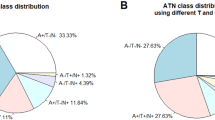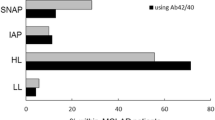Abstract
The aim of this study is to approach cerebrospinal fluid (CSF) Aβ1-42 and p-Tau181 as risks factors in predicting progression from amnestic mild cognitive impairment (aMCI) to Alzheimer’s disease dementia (ADD) in a 5-year follow-up. Forty-two individuals diagnosed as aMCI or subjective cognitive impairment (SCI) were evaluated in 2013 and reevaluated in 2018. CSF Aβ1–42 and p-Tau181 were measured by immunoenzymatic assay. Differences in cognitive performance between endpoint and baseline were verified by neuropsychological tests. Of the aMCI individuals, 45.2% progressed to ADD in 5 years. The relative risk to develop ADD in individuals with aMCI and Aβ1–42 < 618.5 pg/mL was 5.8 times higher than in those whose levels were above this cutoff (P = 0.0011). Moreover, the relative risk among those in which the p-Tau181/Aβ1–42 ratio was higher than 0.135 was 3.83 times greater (P = 0.0001). Both Aβ1–42 and p-Tau181 levels explained 47.5% of ΔCERADs variance (P < 0.001), whereas Aβ1–42 alone explained 38.6% (P < 0.001). Aβ1–42 provided 5.8 times higher cumulative risk to the progression from aMCI to ADD in a 5-year follow-up. The p-Tau181/Aβ1–42 ratio was no better than Aβ1–42 alone. However, p-Tau181 levels helped to explain an extra 9% of ΔCERADs variance.

Similar content being viewed by others
References
Jack CR, Bennett DA, Blennow K, Carrillo MC, Dunn B, Haeberlein SB, et al. NIA-AA Research Framework: toward a biological definition of Alzheimer’s disease. Alzheimers Dement. 2018;14:535–62.
Petersen RC. How early can we diagnose Alzheimer disease (and is it sufficient)? The 2017 Wartenberg lecture. Neurology. 2018;91:395–402.
Shin S, Kim JH, Cho JH, Kim GS, Choi SA, Lee JH, et al. Mild cognitive impairment due to Alzheimer disease is less likely under the age of 65. Alzheimer Dis Assoc Disord. 2015;29:26–31.
Mantzavinos V, Alexiou A. Biomarkers for Alzheimer’s disease diagnosis. Curr Alzheimer Res. 2017;14:1149–54.
Rizzi L, Missiaggia L, Roriz-Cruz M. CSF Aβ 1–42 , but not p-Tau181, predicted progression from amnestic MCI to Alzheimer’s disease dementia. NeuroMolecular Med. 2018.
Rizzi L, Maria Portal M, Batista CEA, Missiaggia L, Roriz-Cruz M. CSF Aβ1–42, but not p-Tau181, differentiates aMCI from SCI. Brain Res. 1678;2018:27–31.
Petersen RC, Caracciolo B, Brayne C, Gauthier S, Jelic V, Fratiglioni L. Mild cognitive impairment: a concept in evolution. J Intern Med. 2014;275:214–28.
Albert MS, DeKosky ST, Dickson D, Dubois B, Feldman HH, Fox NC, et al. The diagnosis of mild cognitive impairment due to Alzheimer’s disease: recommendations from the National Institute on Aging-Alzheimer’s Association workgroups on diagnostic guidelines for Alzheimer’s disease. Alzheimers Dement. 2011;7:270–9.
Morris JC. The Clinical Dementia Rating (CDR): current version and scoring rules. Neurology. 1993;43:2412–4.
Morris JC, Heyman A, Mohs RC, Hughes JP, van Belle G, Fillenbaum G, et al. The Consortium to Establish a Registry for Alzheimer’s Disease (CERAD). part I. clinical and neuropsychological assessment of Alzheimer’s disease. Neurology. 1989;39:1159–65.
Bertolucci PHF, Okamoto IH, Toniolo Neto J, Ramos LR, Brucki SMD. Desempenho da populacao brasileira na bateria neuropsicologica do Consortium to Establish a Registry for Alzheimer’s Disease (CERAD). São Paulo: Revista de Psiquiatria Clínica; 1998. p. 80–3.
Shulman KI, Gold DP, Cohen CA, Zucchero CA. Clock-drawing and dementia in the community: a longitudinal study. Int J Geriatr Psychiatry. 1993;8:487–96.
Aprahamian I, Martinelli JE, Neri AL, Yassuda MS. The accuracy of the clock drawing test compared to that of standard screening tests for Alzheimer’s disease: results from a study of Brazilian elderly with heterogeneous educational backgrounds. Int Psychogeriatr. 2010;22:64–71.
Yesavage JA, Brink TL, Rose TL, Lum O, Huang V, Adey M, et al. Development and validation of a geriatric depression screening scale: a preliminary report. J Psychiatr Res. 1982;17:37–49.
Almeida O, Almeida S. Confiabilidade da versão brasileira da Escala de Depressão em Geriatria (GDS) versão reduzida. Arq Neuropsiquiatr. 1999;57:421–6.
Nasreddine ZS, Phillips NA, Bédirian V, Charbonneau S, Whitehead V, Collin I, et al. The Montreal Cognitive Assessment, MoCA: a brief screening tool for mild cognitive impairment. J Am Geriatr Soc. 2005;53:695–9.
Memória CM, Yassuda MS, Nakano EY, Forlenza OV. Brief screening for mild cognitive impairment: validation of the Brazilian version of the Montreal cognitive assessment. Int J Geriatr Psychiatry. 2013;28:34–40.
Kaplan E, Goodglass H, Weintraub S. Boston Naming Test. Philadelphia: Lea & Febiger; 1983.
Miotto EC, Sato J, Lucia MC, Camargo CH, Scaff M. Development of an adapted version of the Boston Naming Test for Portuguese speakers. Rev Bras Psiquiatr. 2010;32:279–82.
Isaacs B, Kennie AT. The set test as an aid to the detection of dementia in old people. Br J Psychiatry. 1973;123:467–70.
Brucki SM, Malheiros SM, Okamoto IH, Bertolucci PH. Normative data on the verbal fluency test in the animal category in our milieu. Arq Neuropsiquiatr. 1997;55:56–61.
Rosen WG, Mohs RC, Davis KL. A new rating scale for Alzheimer’s disease. Am J Psychiatry. 1984;141:1356–64.
Bertolucci PH, Okamoto IH, Brucki SM, Siviero MO, Toniolo Neto J, Ramos LR. Applicability of the CERAD neuropsychological battery to Brazilian elderly. Arq Neuropsiquiatr. 2001;59:532–6.
McKhann GM, Knopman DS, Chertkow H, Hyman BT, Jack CR, Kawas CH, et al. The diagnosis of dementia due to Alzheimer’s disease: recommendations from the National Institute on Aging-Alzheimer’s Association workgroups on diagnostic guidelines for Alzheimer’s disease. Alzheimers Dement. 2011;7:263–9.
Steenland K, Zhao L, John SE, Goldstein FC, Levey A, Alvaro A, et al. A ‘Framingham-like’ algorithm for predicting 4-year risk of progression to amnestic mild cognitive impairment or Alzheimer’s disease using multidomain information. J Alzheimers Dis. 2018;63:1383–93.
Tondelli M, Bedin R, Chiari A, Molinari MA, Bonifacio G, Lelli N, et al. Role of cerebrospinal fluid biomarkers to predict conversion to dementia in patients with mild cognitive impairment: a clinical cohort study. Clin Chem Lab Med. 2015;53:453–60.
Lange C, Suppa P, Pietrzyk U, Makowski MR, Spies L, Peters O, et al. Prediction of Alzheimer’s dementia in patients with amnestic mild cognitive impairment in clinical routine: incremental value of biomarkers of neurodegeneration and brain amyloidosis added stepwise to cognitive status. J Alzheimers Dis. 2018;61:373–88.
Mitchell AJ, Shiri-Feshki M. Rate of progression of mild cognitive impairment to dementia--meta-analysis of 41 robust inception cohort studies. Acta Psychiatr Scand. 2009;119:252–65.
Ekman U, Ferreira D, Westman E. The A/T/N biomarker scheme and patterns of brain atrophy assessed in mild cognitive impairment. Sci Rep. 2018;8:8431.
Bjerke M, Engelborghs S. Cerebrospinal fluid biomarkers for early and differential Alzheimer’s disease diagnosis. J Alzheimers Dis. 2018;62:1199–209.
Buchhave P, Minthon L, Zetterberg H, Wallin AK, Blennow K, Hansson O. Cerebrospinal fluid levels of β-amyloid 1-42, but not of tau, are fully changed already 5 to 10 years before the onset of Alzheimer dementia. Arch Gen Psychiatry. 2012;69:98–106.
Ferreira D, Perestelo-Pérez L, Westman E, Wahlund LO, Sarría A, Serrano-Aguilar P. Meta-review of CSF core biomarkers in Alzheimer’s disease: the state-of-the-art after the new revised diagnostic criteria. Front Aging Neurosci. 2014;6:47.
Prestia A, Caroli A, Wade SK, van der Flier WM, Ossenkoppele R, Van Berckel B, et al. Prediction of AD dementia by biomarkers following the NIA-AA and IWG diagnostic criteria in MCI patients from three European memory clinics. Alzheimers Dement. 2015;11:1191–201.
van Rossum IA, Vos SJ, Burns L, Knol DL, Scheltens P, Soininen H, et al. Injury markers predict time to dementia in subjects with MCI and amyloid pathology. Neurology. 2012;79:1809–16.
Gainotti G, Quaranta D, Vita MG, Marra C. Neuropsychological predictors of conversion from mild cognitive impairment to Alzheimer’s disease. J Alzheimers Dis. 2014;38:481–95.
Rami L, Fortea J, Bosch B, Solé-Padullés C, Lladó A, Iranzo A, et al. Cerebrospinal fluid biomarkers and memory present distinct associations along the continuum from healthy subjects to AD patients. J Alzheimers Dis. 2011;23:319–26.
Haapalinna F, Paajanen T, Penttinen J, Kokki H, Kokki M, Koivisto AM, et al. Low cerebrospinal fluid amyloid-beta concentration is associated with poorer delayed memory recall in women. Dement Geriatr Cogn Dis Extra. 2016;6:303–12.
Haldenwanger A, Eling P, Kastrup A, Hildebrandt H. Correlation between cognitive impairment and CSF biomarkers in amnesic MCI, non-amnesic MCI, and Alzheimer’s disease. J Alzheimers Dis. 2010;22:971–80.
Monastero R, Mangialasche F, Camarda C, Ercolani S, Camarda R. A systematic review of neuropsychiatric symptoms in mild cognitive impairment. J Alzheimers Dis. 2009;18:11–30.
Trzepacz PT, Hochstetler H, Wang S, Walker B, Saykin AJ, Initiative AsDN. Relationship between the Montreal Cognitive Assessment and Mini-mental State Examination for assessment of mild cognitive impairment in older adults. BMC Geriatr. 2015;15:107.
Monge-Argilés JA, Gasparini-Berenguer R, Gutierrez-Agulló M, Muñoz-Ruiz C, Sánchez-Payá J, Leiva-Santana C. Influence of APOE genotype on Alzheimer’s disease CSF biomarkers in a Spanish population. Biomed Res Int. 2016;2016:1390620.
Funding
This study was supported by the CAPES-CNPQ (Grant number: 476387/2013-2) and FIPE (Process: 13-0009). All authors declare that their funding source had no role in the study design, in the collection, analysis and interpretation of data, in the writing of the report, and in the decision to submit the paper for publication.
Author information
Authors and Affiliations
Contributions
All authors contributed to the study conception and design. Material preparation, data collection, and analysis were performed by Liara Rizzi and Luciane Missiaggia. The first draft of the manuscript was written by Liara Rizzi, and all authors commented on previous versions of the manuscript. All authors read and approved the final manuscript.
Corresponding author
Ethics declarations
Conflict of interest
The authors declare that they have no conflict of interest.
Ethical Approval
This study was approved by the local research ethics committee Hospital de Clínicas de Porto Alegre (number 13-0009) and is in accordance with the Declaration of Helsinki.
Informed Consent
All participants or their legally authorized representative gave their written consent in order to participate in this study.
Additional information
Publisher’s Note
Springer Nature remains neutral with regard to jurisdictional claims in published maps and institutional affiliations.
This article is part of the Topical Collection on Medicine
Rights and permissions
About this article
Cite this article
Rizzi, L., Missiaggia, L., Schwartz, I.V.D. et al. Value of CSF Biomarkers in Predicting Risk of Progression from aMCI to ADD in a 5-Year Follow-Up Cohort. SN Compr. Clin. Med. 2, 1543–1550 (2020). https://doi.org/10.1007/s42399-020-00437-3
Accepted:
Published:
Issue Date:
DOI: https://doi.org/10.1007/s42399-020-00437-3




